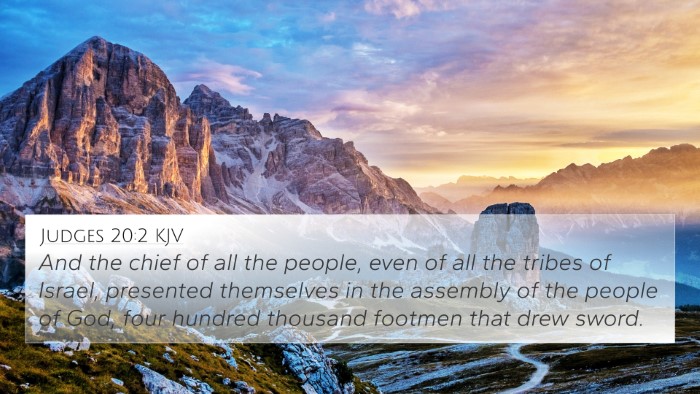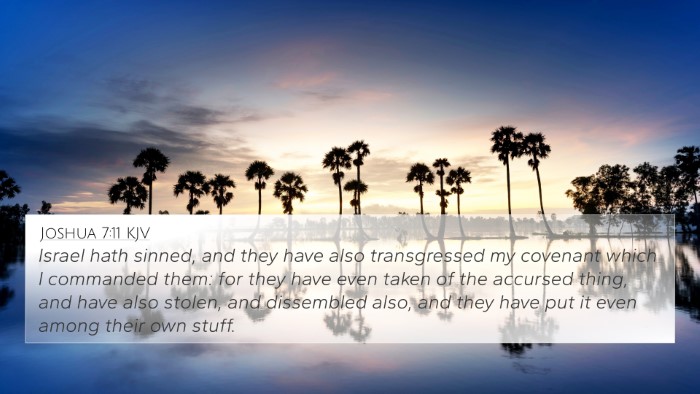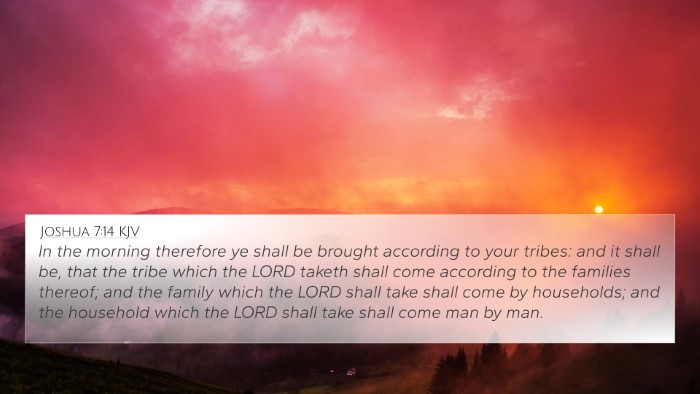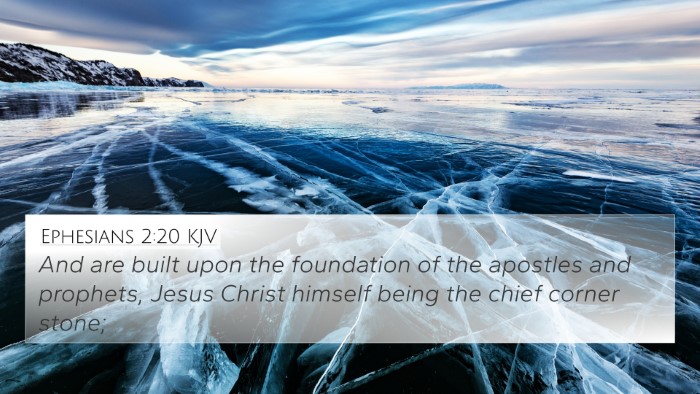1 Samuel 14:38 - Verse Summary and Commentary
This verse occurs in the context of King Saul's inquiry of God regarding the cause of Israel's defeat in battle. The verse reads:
“And Saul said, ‘Draw near here, all you chiefs of the people, and know and see wherein this sin hath been this day.’” (1 Samuel 14:38)
Interpretation and Insights from Commentaries:
Context of the Verse:
In this passage, Saul is recognizing the importance of understanding the spiritual reasons behind the calamity faced by Israel. This reflects a crucial principle in biblical leadership, where acknowledging sin and seeking divine guidance is paramount.
Matthew Henry's Commentary:
Matthew Henry emphasizes that Saul's call to the people represents a moment of responsibility. He is not only standing before his men but also addressing spiritual matters related to Israel’s sin. Henry expounds on Saul’s character, suggesting that this inquiry highlights the importance of communal holiness and collective responsibility. The king’s request suggests that sin can be a corporate issue, drawing the whole community into the reckoning.
Albert Barnes' Commentary:
Barnes stresses that this verse illustrates Saul's desperation to discern the reason behind their defeat. It shows Saul actively trying to maintain his duty as king, indicating awareness of the divine’s role in military success and failure. He notes that Saul’s insistence on uncovering the sin encourages a theme of accountability and outreach to God. This inquiry reflects the understanding that the leaders must seek divine favor for successful endeavors.
Adam Clarke's Commentary:
Clarke points out that Saul's declaration also serves as a means to unify the leaders in seeking God’s guidance. He mentions that the sin referred to could be tied to Jonathan's unknowing actions during the battle. Clarke’s analysis invites readers to consider the interconnectedness of human actions and spiritual consequences, emphasizing that individual actions can have collective repercussions.
Bible Verse Cross-References:
- 1 Samuel 14:33 - Saul recognizes the guilt in eating before God’s command was fulfilled.
- Joshua 7:10-12 - The sin of Achan and its impact on Israel highlights collective accountability.
- 2 Chronicles 7:14 - Calls for national repentance and seeking God’s face to heal the land.
- Isaiah 59:2 - Describes how sin separates people from God and affects their circumstances.
- Matthew 5:14-16 - Discusses the influence of a community reflecting God in their actions.
- Galatians 6:7 - Encourages understanding that one reaps what they sow, reflecting on accountability for actions.
- James 5:16 - Highlights the power of confession among a community and prayer for healing.
Thematic Bible Verse Connections:
- Corporate Responsibility: Emphasizes that individuals within a community can influence collective outcomes.
- Seeking God's Guidance: Reflects the necessity of divine insight in matters of leadership and decisions.
- Sin and Its Consequences: Illustrates the need to recognize and address sin to restore divine favor.
Comparative Bible Verse Analysis:
The examination of this verse against other scriptural instances of communal sin reveals a pattern. Saul's inquiry connects to narratives where community actions affect divine judgment:
- Numbers 14:34-38: The consequences of Israel's collective rejection of God’s promise illustrated through the spies’ report.
- 1 Corinthians 5:6: Paul warns that a little leaven corrupts the whole lump, indicating communal implications of personal sin.
Concluding Thoughts:
1 Samuel 14:38 serves as a poignant reminder of the importance of spiritual leadership and the need for the community to seek God’s guidance in times of crisis. By understanding that individual actions can influence the broader community, believers can recognize the interconnectedness present in biblical narratives.
Tools for Bible Cross-Referencing:
For those looking to delve deeper into the connections woven throughout the scriptures, a Bible concordance or cross-reference Bible study guide can be invaluable. These tools facilitate an exploration of scriptures that relate to each other, thereby enriching one’s understanding of biblical themes and messages.












